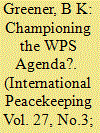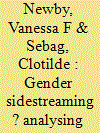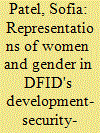|
|
|
Sort Order |
|
|
|
Items / Page
|
|
|
|
|
|
|
| Srl | Item |
| 1 |
ID:
178085


|
|
|
|
|
| Summary/Abstract |
The Women, Peace and Security (WPS) agenda is a diverse field of practice comprised of numerous actors, activities and artefacts. Conventional accounts of WPS development and implementation tend to reproduce a narrative that positions states located in the global North as ‘providers’ of WPS, and those in the South as ‘recipients’. This assumption in turn prescribes, and proscribes, forms of WPS engagement and has a constitutive effect on the agenda itself, as shown by post- and de-colonial analyses of the WPS agenda. This article seeks to explore the WPS practices of a group of states that in many ways challenge these North/South and provider/recipient binaries by explicitly positioning themselves as operating beyond and across them: the BRICS countries, comprised of Brazil, Russia, India, China and South Africa. In this article, we explore how constructions of conflict within the WPS practices of BRICS states relate to the acknowledgement of, and commitment to, the agenda more broadly. We ultimately argue that the BRICS' commitment to the WPS agenda is driven more by identity-making geopolitical considerations, including geostrategic interests, than a politics of peace.
|
|
|
|
|
|
|
|
|
|
|
|
|
|
|
|
| 2 |
ID:
171970


|
|
|
|
|
| Summary/Abstract |
This article draws on official sources to investigate how New Zealand interpreted its Women, Peace and Security obligations through the development and implementation of its first National Action Plan (NAP) in 2015. Existing beliefs that New Zealand was already a ‘world leader’ in this field yielded an unambitious document. Government agencies such as the New Zealand Police (NZ Police) and New Zealand Defence Force (NZDF) have gone on to make some gains under the narrow remit of the NAP, but resourcing and accountability are lacking. Moreover, this focus on perceived existing strengths, and the drawing of objectives from these, meant that New Zealand missed an opportunity to initiate the kind of deeper structural changes initially envisaged by WPS advocates. This article therefore closes with a discussion of how two broader processes – ‘re-gendering’ and ‘de-othering’ – could help New Zealand to better serve the original intent of the WPS agenda.
|
|
|
|
|
|
|
|
|
|
|
|
|
|
|
|
| 3 |
ID:
178500


|
|
|
|
|
| Summary/Abstract |
Twenty years after the passing of Resolution 1325, the participation of women as military personnel in peacekeeping operations remains limited. Women currently comprise just under five per cent of military personnel in UN peacekeeping missions, and the UN consistently calls for more. We contend the low numbers of female military personnel in peacekeeping reflects a lack of gender mainstreaming in national militaries globally. This article introduces the problem of sidestreaming, the practice, deliberate or unintentional, of sidelining women and relegating them to specialised spaces in international peace and security while attempting gender mainstreaming or increased gender integration. Drawing on empirical evidence from national militaries we show how and where sidestreaming occurs with the result being that women remain clustered in gendered and low-status spaces in national militaries and in specialised spaces in peacekeeping operations. This has a negative effect on retention and recruitment contributing to the low numbers of female peacekeepers in UN peace operations. We conclude that gender mainstreaming in its fullest sense will require military reform that decouples violence and combat skills from masculinity and inclusive research strategies that engage men as well as women.
|
|
|
|
|
|
|
|
|
|
|
|
|
|
|
|
| 4 |
ID:
187147


|
|
|
|
|
| Summary/Abstract |
In a post-9/11 environment, the Department for International Development (DFID) shifted its strategic focus towards an integrationist approach that aligned mainstream development programming with the national security agenda. A key part of those reforms was integrating counterterrorism – directly and indirectly – into DFID's portfolio. Using a feminist institutionalist approach, I examine how discourses about women, development, security, and counterterrorism are reproduced through a ‘development-security-counterterrorism nexus’. Within the nexus, DFID represents a key site for the production, reproduction, and evolution of gendered discursive practices1 about women. I argue that institutional evolution is possible through a process of discursive evolution where certain discourses become more or less engrained or ‘sedimented’2 depending on the presence of alternative ideas and knowledges. The central research question asks how did gender-sensitive development work evolve after 9/11 and what factors influenced and shaped this evolution? The main findings were that as counterterrorism aims, objectives, and methods became more emphasised in UK development programming, a sense of institutional incoherence and poor strategic direction adversely affected how gender-sensitive programming was designed and implemented. Furthermore, I conclude that gendered development policy was largely based on assumptions rather than evidence, which negatively impacted how programmes were implemented.
|
|
|
|
|
|
|
|
|
|
|
|
|
|
|
|
| 5 |
ID:
187526


|
|
|
|
|
| Summary/Abstract |
Operative paragraph 7 of UN Security Council (UNSC) Resolution 2532 (2020) acknowledges ‘the critical role that women are playing in the COVID-19 response efforts’, the ‘disproportionate negative impact the pandemic is having on women and girls’, and ‘calls for concrete actions to minimise this impact and ensure the full, equal and meaningful participation of women and youth in the development and implementation of an adequate and sustainable response to the pandemic’. This Resolution is clear in its language: states must recognise and respond to the gendered effects of the pandemic. The adoption of Resolution 2532 and subsequently 2565 (2021) is an important opportunity to further integrate health emergencies and UNSC’s Women, Peace, and Security (WPS) agenda. The language is deliberate: it offers global health a set of mechanisms on how to integrate gender into complex crises and, in turn, offers WPS a chance to engage with health and pandemics as a security challenge for women and girls. However, as previous health emergencies and the WPS agenda show us, Resolutions are not a panacea: they are political compromises often riddled with contradictions and are dependent on states and the international community to implement them.
|
|
|
|
|
|
|
|
|
|
|
|
|
|
|
|
|
|
|
|
|